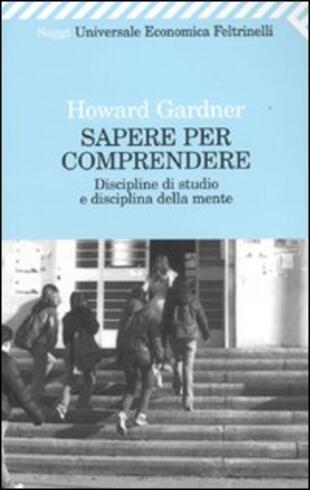

Sinossi
Nonostante sia ormai universalmente riconosciuto che la qualità del sistema educativo di un paese è un fattore determinante per la sua crescita e il suo sviluppo, troppo spesso il dibattito pedagogico si esaurisce in sterili contrapposizioni fra progressisti e tradizionalisti o resta confinato ad aspetti secondari e particolaristici. "Sapere per comprendere" non si sottrae invece alla cruciale questione di definire metodi e contenuti di un'"educazione per tutti", il cui fine deve essere la formazione di individui capaci di comprendere, affrontare e migliorare il mondo in cui vivono. Ciò è possibile soltanto attraverso lo studio e la conoscenza della condizione umana, passata e presente, e soprattutto attraverso una profonda comprensione delle sfere del vero (e del falso), del bello (e del brutto), del bene (e del male). Gardner passa quindi in rassegna diverse istituzioni scolastiche contemporanee, dalle scuole materne di Reggio Emilia alle università statunitensi, analizzandone limiti e vantaggi, articolando sei percorsi educativi in grado di rispondere alle esigenze di differenti sistemi culturali.
- ISBN:
- Casa Editrice:
- Pagine: 320
- Data di uscita: 09-04-2009
Recensioni
Nauseating. I expected so much more from this book--I mean, it's HOWARD GARDNER. Of multiple intelligences fame! This was the theory that I most resonated with in college, & although I got it second-hand (through textbooks) I have always wanted to read Gardner's theory in his own words. I expected e Leggi tutto
Very convoluted with a bunch of listicle chapters. Didn't really dig it, perhaps because it's aimed at K-12 education. People are better able to chart their life course and make life decisions when they know how others have dealt with pressures and dilemmas. We need an education that is deeply rooted i Leggi tutto
Anyone who works with kids and pays attention must realize that many of them are talented--even brilliant--in ways that are not recognized or valued in schools. The concept of "multiple intelligences," first proposed by Howard Gardner twenty-five years ago, helps to explain why most schools, heavily Leggi tutto
His theories on what 'schooling' should look like. Good book for debates and discussions. I don't like Gardner - as he does believe that education and schools (he is not pro-home schoolng) should train children how to be successful workers in big buisness (and learn the 'classics') - however, he doe Leggi tutto
nonostante l’abbia letto per studio e non per piacere mi è piaciuto molto. Molto scorrevole e semplice in quanto scritto in un’ottica abbastanza divulgativa. I concetti sono pochi, si ripetono e sono spiegati a fondo.
Started out strong, but then got convoluted. Quotable points: "Effective education can take many different forms, but certain features must be present. Those who run the school -- or network of schools -- must have a clear vision of what they want to achieve. Mission statements may be helpful, but th Leggi tutto
Fortunately for readers (and anyone connected to education), Gardner has not been idle since he first published his benchmark book Frames of Mind. I sincerely appreciated reading how he has continued to develop his thinking in cognitive psychology and his suggestions for education need to be taken s Leggi tutto
I can't imagine a better single explanation about what education should be. He hints at just enough of his own worldview to tell me we wouldn't agree on everything. But in a way, that is the point, because Gardner adeptly conveys that an educated mind is one that can intelligently assess ideas at a
buku bagus, terutama bagi yang konsep dengan konsep, pola dan struktur berpikir...
Citazioni
Al momento non ci sono citazioni, inserisci tu la prima!























